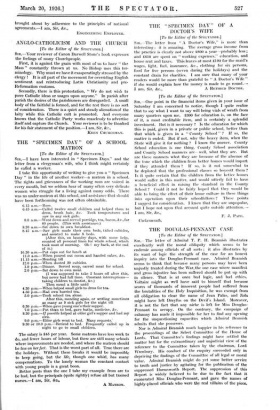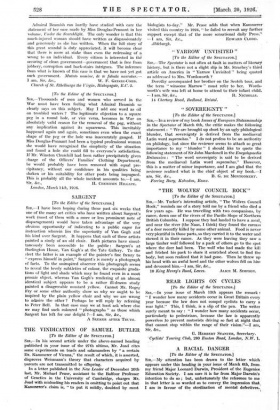THE DOUGLAS-PENNANT CASE
[To the Editor of the SPECTATOR.] Sin,-The letter of Admiral T. P. II. Beamish illustrates excellently well the moral obliquity which seems to be endemic among officials of all sorts ; it also illustrates by its want of logic the strength of the case for an honest inquiry into the Douglas-Pennant case. Admiral Beamish seems to think that becaulse many persons may have been unjustly treated during the War, the one case where manifest and gross injustice has been suffered should be put up with in silence. That is at once bad logic, and bad ethics. Voltaire might as well have said to himself that because scores of thousands of innocent people had suffered from the brutalities of the Holy Inquisition, he was exempt from all obligation to clear the name of Jean Palas, and Zola might have left Dreyfus on the Devil's Island. Moreover, it is not the fact that any niche is left for Miss Douglas- Pennant to occupy. On the contrary, the campaign of calumny his made it impossible for her to find any opening for the unquestioning capacities which Admiral Beamish admits that she possesses.
Nor is Admiral Beamish much happier in his reference to the proceedings of the Select Committee of the House of Lords. That Committee's findings might have settled the matter but for the extraordinary and unjudicial view of the reference to the Committee taken by the chairman, Lord Wrenbury. His conduct of the enquiry succeeded only in depriving the findings of the Committee of all legal or moral value. Admiral Beamish might do yet some better service to truth and justice by agitating for the publication of the suppressed Harmsworth Report. The suppression of this Report is widely believed to be due to the fact that it exonerated Miss Douglas-Pennant, and gave the names of highly-placed officials who were the real villains of the piece, Admiral Beamish can hardly have studied with care the statement of her case made by Miss Douglas-Pennant in her volume, Under the Searchlight. The only wonder is that this much-injured woman should have written as dispassionately and generously as she has written. When the full story of this great scandal is duly appreciated, it will become clear that there is more at stake than even the redressing of a wrong to an individual. Every citizen is interested in the securing of clean government—government that is free from jobbery, corruption and back-stairs intrigues. The inference from what is known of this case is that we have not yet got such government. Mutato nomine, de to fabula narratur.—



























































 Previous page
Previous page